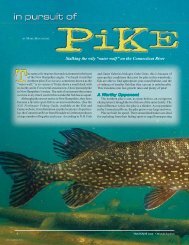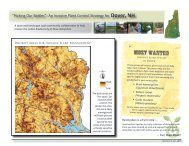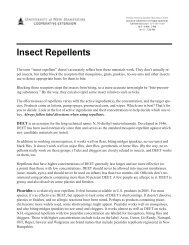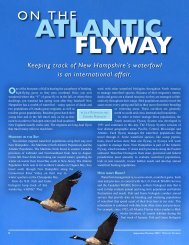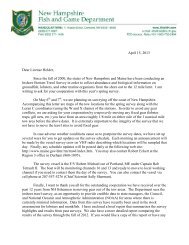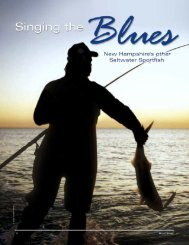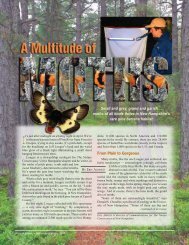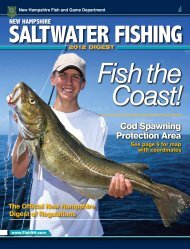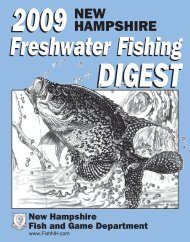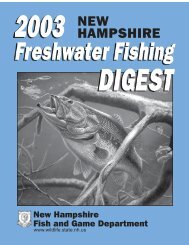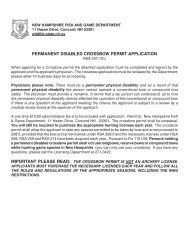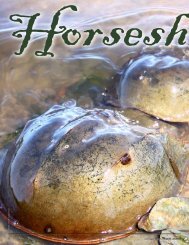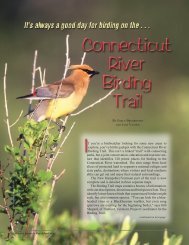the 2010 digest - New Hampshire Fish and Game Department
the 2010 digest - New Hampshire Fish and Game Department
the 2010 digest - New Hampshire Fish and Game Department
You also want an ePaper? Increase the reach of your titles
YUMPU automatically turns print PDFs into web optimized ePapers that Google loves.
Stop Aquatic Hitchhikers!<br />
It’s up to boaters <strong>and</strong> anglers to keep nuisance species from invading N.H.’s waters!<br />
Several species of non-native aquatic plants invade waterbodies, forming thick underwater<br />
st<strong>and</strong>s of tangled stems <strong>and</strong> vast mats of vegetation at <strong>the</strong> water’s surface. They can<br />
crowd out important native water plants. Once <strong>the</strong>y become established, aquatic nuisance<br />
species can be impossible to contain <strong>and</strong> control—so please make sure you’re not accidentally<br />
bringing an aquatic hitchhiker into <strong>the</strong> state!<br />
To prevent <strong>the</strong> transport of aquatic nuisance species, please clean all recreational equipment.<br />
Whenever you leave a body of water:<br />
• Remove any visible mud, plants, fish or animals.<br />
• Drain water from equipment (engine water intake systems, bilge, live wells, bait buckets).<br />
• Clean <strong>and</strong> dry anything that comes into contact with water (boats, trailers, equipment, etc.)<br />
• Never release plants, fish or animals into a body of water unless <strong>the</strong>y came out of that<br />
body of water. It’s <strong>the</strong> law!<br />
Invasive Plants »<br />
It is illegal to transport, import, purchase,<br />
propagate, sell or distribute 14 species of<br />
non-native aquatic plants in NH. Among<br />
<strong>the</strong>m are: Eurasian milfoil, variable milfoil,<br />
fanwort, purple loosestrife <strong>and</strong> water<br />
chestnut.<br />
Milfoil<br />
Edward Woltmann<br />
Keep VHS Out<br />
Viral Hemorrhagic Septicemia or VHS<br />
virus is a fish disease that arrived in <strong>the</strong><br />
Great Lakes region just a few years ago.<br />
VHS is not a threat to people who h<strong>and</strong>le<br />
or eat infected fish, but it can kill more<br />
than 25 fish species—making it <strong>the</strong> most<br />
significant fish disease problem in <strong>the</strong> US<br />
in <strong>the</strong> last 50 years, with <strong>the</strong> potential to<br />
devastate freshwater fish populations.<br />
To date, <strong>the</strong>re have been no VHS-infected<br />
fish collected in <strong>New</strong> <strong>Hampshire</strong>, but <strong>the</strong><br />
virus has been found in several <strong>New</strong> York<br />
waters, <strong>and</strong> <strong>the</strong>re is a real threat that it<br />
will reach our waters over time. There is<br />
no vaccination or cure for <strong>the</strong> disease, so<br />
it can’t be controlled—only contained.<br />
You can help by not moving fish, including<br />
bait fish, from one waterbody to ano<strong>the</strong>r.<br />
If you suspect VHS virus or see a fish kill,<br />
immediately report it to NH <strong>Fish</strong> <strong>and</strong> <strong>Game</strong><br />
at (603) 744-5470.<br />
« ZEBRA MUSSELS<br />
These non-natives cause numerous problems,<br />
including attaching <strong>the</strong>mselves to boat<br />
hulls <strong>and</strong> clogging water intake systems.<br />
Let’s keep zebra mussels out of NH.<br />
Zebra Mussels<br />
DIDYMO »<br />
Didymosphenia geminata, a.k.a. “didymo”<br />
or “rock snot,” has been discovered in <strong>the</strong><br />
Connecticut River <strong>and</strong> its tributaries. If you<br />
fish, boat or swim in this river, be sure to<br />
disinfect all of your items before using <strong>the</strong>m<br />
elsewhere. Visit www.des.nh.gov <strong>and</strong> search<br />
“didymo” for more details so YOU don’t<br />
spread this organism.<br />
Didymo<br />
Tyler Baker<br />
For more information, contact <strong>the</strong> NH <strong>Department</strong> of Environmental Services Exotic<br />
Species Program at (603) 271-2963, www.des.nh.gov; NH <strong>Fish</strong> <strong>and</strong> <strong>Game</strong> at (603) 271-2501,<br />
www.<strong>Fish</strong>NH.com; or www.protectyourwaters.net.<br />
livewell<br />
motor &<br />
propeller<br />
anchor<br />
Check your boat <strong>and</strong> equipment <strong>and</strong> remove<br />
any plants or o<strong>the</strong>r materials. Milfoil <strong>and</strong> o<strong>the</strong>r<br />
aquatic invasives can easily adhere to propellers<br />
<strong>and</strong> many o<strong>the</strong>r catch points on your boat.<br />
hitch<br />
hull<br />
axle<br />
trim tabs<br />
28 <strong>2010</strong> <strong>New</strong> <strong>Hampshire</strong> Freshwater <strong>Fish</strong>ing Digest



